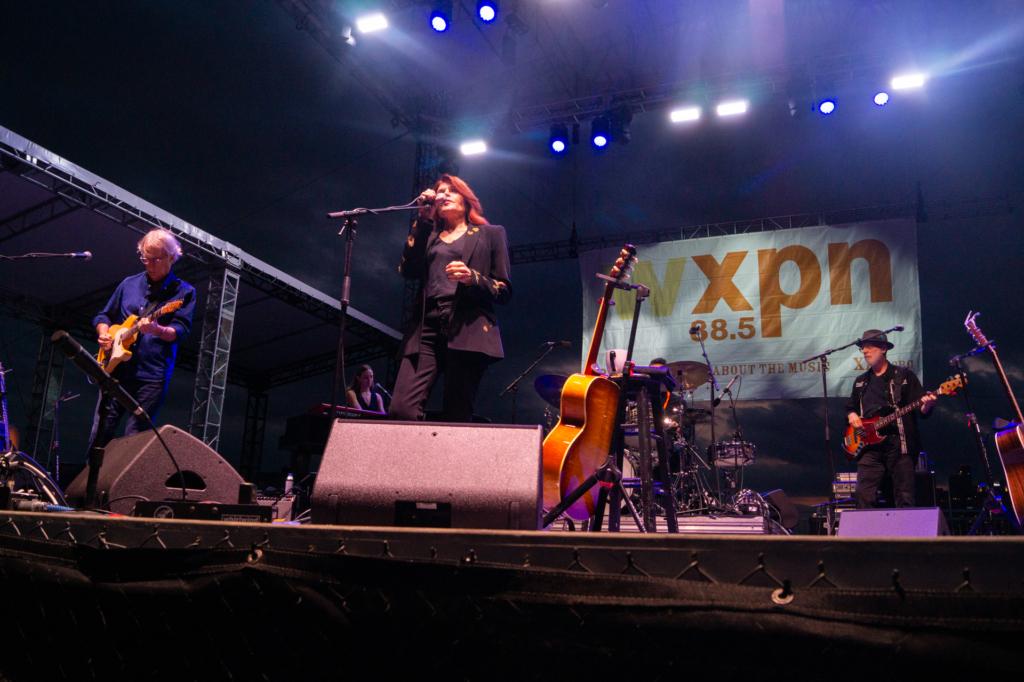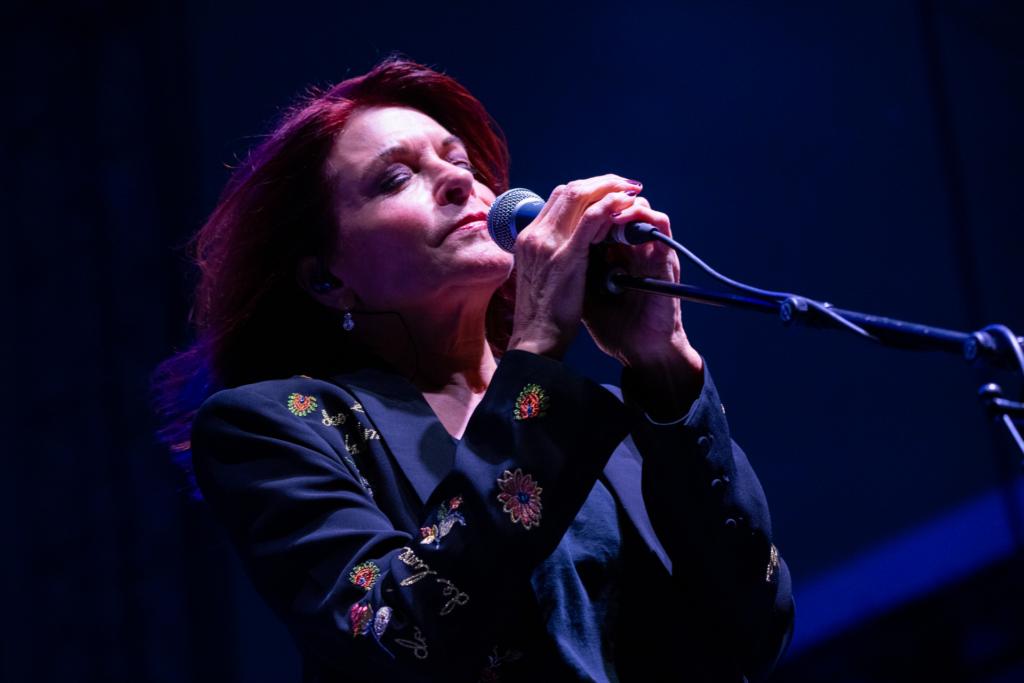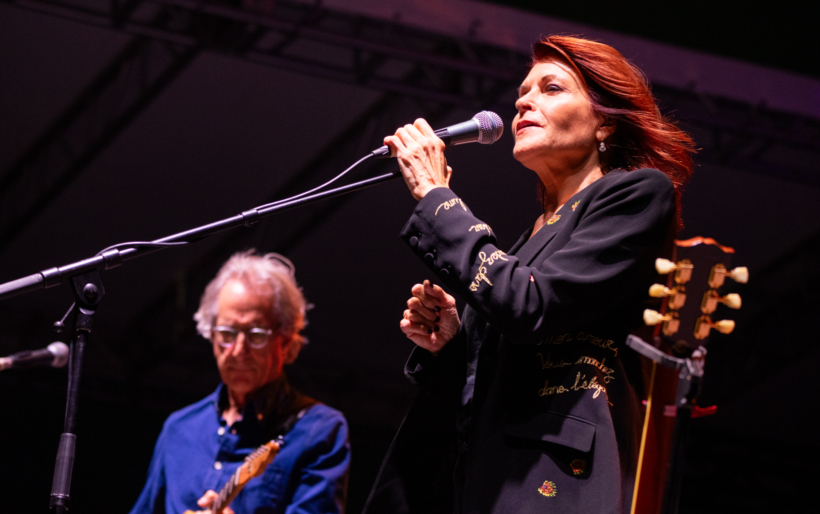As I stood in the crowd, waiting for Rosanne Cash to take the stage, I couldn’t help but think about how history moves in cycles — how the smallest choices shape the stories of our lives. Stories are everything, but they only exist if they’re told. The Cash family has never let theirs fade into silence. In 1986, after 28 years, Columbia Records dropped Johnny Cash. Instead of backing down, he went on to record some of the greatest albums of his career. Both Johnny and Rosanne faced the same struggle: labels that didn’t quite understand their vision. Rosanne left Columbia in 1994 when they refused to properly promote Interiors, her first fully self-written album. This history formed the backbone of Rosanne Cash’s performance at WXPN’s XPoNential Music Festival.
As she took the River Stage, her presence transformed the space. Celebrating three decades in music, her journey is rich with memories, historical storytelling, and musical intimacy. Cash opened her set with “A Feather’s Not a Bird” from The River & The Thread, standing empty-handed at the mic while lead guitarist John Leventhal delivered a soft solo. Her clear, resonant voice set a tone of warmth and introspection. She followed with a heartfelt, “Thank you, oh, what a perfect night. My friends at WXPN, I’ve been friends with them for a long time, and it’s great to be back doing anything with XPN.”
One of the night’s most personal moments came as she introduced “The Sunken Lands,” a song rich with historical and personal resonance. Under dramatic blue stage lights, Cash told the story of the sunken lands in the Mississippi Delta, where her father, Johnny Cash, grew up. She wove the tale of her grandmother Carrie Cash, a resilient woman who raised seven children in a home without electricity or running water. Leventhal’s evocative guitar riff underlined her every mention of the “sunken lands.”

Rosanne Cash | photo by Ellen C Miller for WXPN
Cash’s chemistry with Leventhal was a defining element, particularly during “You Won’t Let Me In” from her 30-year-old album The Wheel. Introducing the song, she shared with humor and affection the personal stakes behind the album: “It was a complicated time in our lives… but I knew that tall drink of water was in it,” she said, gesturing to Leventhal. The crowd erupted with laughter as the two exchanged playful banter about how their relationship blossomed during the album’s making. This nostalgic theme continued with “Tears Falling Down,” also from The Wheel. As Leventhal tuned his guitar, Cash complimented the crowd: “Man, you’re a listening crowd for a festival!” The band launched into the song with storming steel solos and lush harmonies that filled the park.
The energy shifted with “Modern Blue,” where stage lights turned to vibrant white, matching the lively feel of the song. Cash’s band was in full swing, with the keyboardist adding dynamic flourishes. The joyful contrast to the earlier reflective moments kept the audience engaged.
Introducing The List, Cash recounted how her father gave her a list of 100 essential country songs when she was 18, calling it her “education.” She performed “Long Black Veil,” a haunting ballad from that list, accompanied only by Leventhal, their duet quieting the park into an attentive reverence. The setlist took a fun detour with a rendition of “Ode to Billie Joe” by Bobbie Gentry. Cash explained how this song was a standard for her and Leventhal while writing The River & The Thread, and the audience sang along with enthusiasm.
“She Remembers Everything,” from an album of the same name, had the full band return, building a powerful crescendo as the late summer breeze drifted through Wiggins Park, with the instrumentals washing over the crowd. Rosanne shared the backstory behind “The Only Thing Worth Fighting For” from the same album. “I wrote this with T Bone Barnett and Lera Lynn,” she said, recalling how T Bone, the music supervisor for True Detective, asked her to write lyrics about destruction. “‘Maybe bombs can go off, and things fall off shelves and break?’ I said, yeah man, that’s my wheelhouse!” she laughed, admitting she hadn’t seen the show because it was too violent, but liked the song so much she recorded it herself.
Another touching moment came during “When the Master Calls the Roll,” where Cash shared how the song’s melody, originally meant for someone else, was inspired by her family’s Civil War history. “Our son was doing a project, and I found out we had ancestors on both sides, Confederate and Union. So, I combined their stories, William and Marianne Cash, in the lyrics.” Everyone laughed when she joked, “Annie Lou is never going to record that song.” she continued, “why don’t I take John’s beautiful melody; you and I rewrite that lyrics about my Civil War ancestors and the tradition of those great narrative bounds. He said ‘alright I’ll do that.’ So William and Marianne are together forever now…”

Rosanne Cash | photo by Ellen C Miller for WXPN
The energy picked up again with “Tennessee Flat Top Box.” “Alright boys, kick it off!” she called out, though the band wasn’t quite ready, leading to a brief, humorous scramble. Once they started, the song exploded with energy, featuring standout basslines and a blistering guitar solo from Leventhal. Rosanne clapped along, getting the crowd involved in the playful atmosphere. Afterward, she introduced the band: “Kevin Berry on guitar! Sam Katz on bass, Dan Rieser on drums, Misty Boyce on keyboard, and John Leventhal bossing us all around.”
Although the band tried to fake out the crowd with a bow, they returned for an encore. “I’m gonna do another one, if you’ve got time, I’ve got time!” she announced. “How about I send you off with a Bob Dylan song?” Most of the crowd seemed onboard, except for one defiant “Nooo!” that rang out. She paused, laughing, “Did somebody just say ‘No?'” amused by the outburst, though there was no turning back now. While I’m sure many would have preferred more of her own stunning music, her cover of Dylan’s “Farewell, Angelina” with its plaintive pedal steel, acoustic guitar, and jazz-infused drumming brought the evening to a satisfying close.
Throughout the evening, Cash’s warmth and authenticity resonated deeply with the crowd. Her set was more than just a musical performance — it was an intimate conversation. She remarked early in the night, “Music is a way to speak to the truth of your life,” and in this performance, she did just that. Celebrating 30 years in music, Rosanne Cash remains a vital force, an artist whose voice continues to carry the history and legacy bestowed to her by her father.
